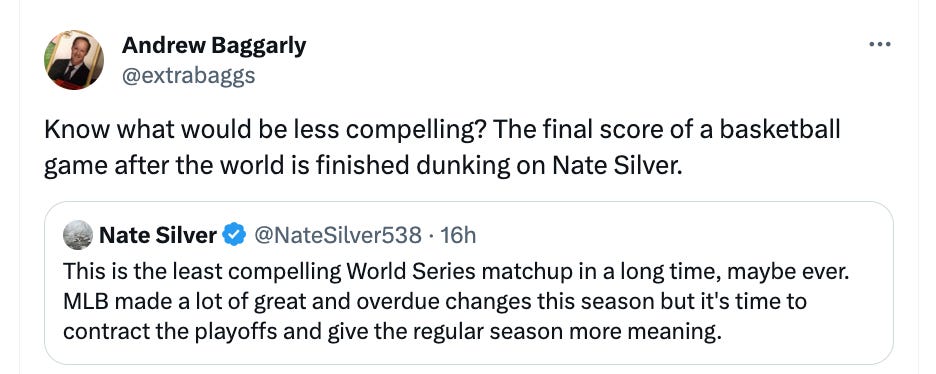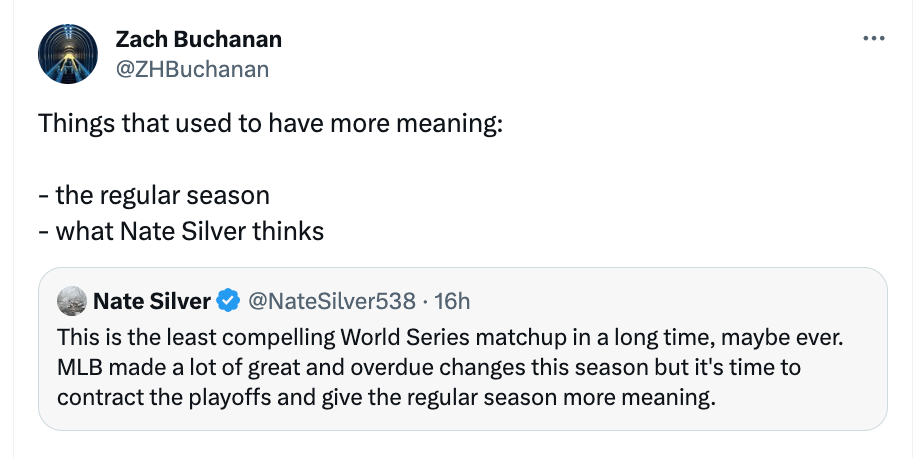Nate Silver is Right
The MLB playoffs could stand to be less random
I am about to show you a tweet that stoked VITRIOL.
Are you horrified? Repulsed? Slightly queasy? Then you’d fit in with many a media member overreacting to, what is, in my opinion, a highly defensible point of view from Friend of HoS Nate Silver:
These days, Nate Silver just makes a type of media person crazy, for a lot of reasons, including but not limited to his refusal to “read the room” on our most memetic platform. At the moment he tweeted that, The Room was celebrating the plucky 84 win Arizona Diamondbacks and their Cindarella run to a World Series matchup against the 90 win Texas Rangers. Silver’s tweet could be taken as rain on Arizona’s parade because, well, it was.
And yet, I totally agree and suspect many other fans do as well. I reject the premise of the Awful Announcing article titled, “Nobody cares that Nate Silver isn’t interested in a Diamondbacks-Rangers World Series,” and not just because that headline is self refuting. It’s this characterization, within the article, that I object to.
Suffice it to say, Silver’s take — which has now been viewed more than two million times — wasn’t a popular one.
Twitter/X overindexes for “please love my sport” media boosters and “please love my ideology” types who yell at poll analysts, but even in that hothouse environment, Nate’s tweet has over a thousand more “Likes” than Quotes. That’s not a perfect proxy for public opinion, but it would suggest that, on this topic, there are more quiet Likers than Screaming Quote Posters.
Which makes sense. MLB has expanded its playoff format, because it is fracking the pie. Fans weren’t demanding this happen, but owners wanted more playoff games and more revenue. This sounded fine enough, but of course there’s a downside.
Baseball involves far more randomness than basketball (even a great MLB team only wins about 60 percent of the time). The more average teams you include in your playoff format, the greater the chance that an average team wins the World Series mostly due to small sample size. Some people enjoy that level of unpredictability, but the downside is that it diminishes the value of the massive, 162 game regular season that millions of fans invest time and money into. If winning half your games leads to a World Series, then why should your fans sweat any day in particular? In theory, there’s incentive to win big because the top teams get a bye, but those teams just performed horribly.
I’m not here to tell you what an ideal playoff format is. I’m also not lamenting the absence of “big markets,” in the World Series (By the way, Arizona and Texas markets aren’t exactly small). What I am saying is that, as a casual fan, I passively followed the season through its great teams. Now, all of a sudden, these surprise teams are competing for “best,” and nobody quite believes they’re actually that. It leads me to conclude that a) the regular season isn’t worth much of my attention and b) the championship isn’t a reward for greatness. I’d say that’s a suboptimal outcome for a sport that’s desperate to gain adherents.
You might disagree, or have a nuanced counterpoint, but I believe this perspective to be pretty reasonable and shared by sports fans beyond myself and Nate Silver. That it’s reacted to as high heresy, and with such Mean Girls nastiness by professional reporters, speaks to why I dislike how the industry looks on X. It’s a place where you’ll voice some low stakes opinion that most, if not a significant minority of people share, and get attacked at scale like you’re a moral freak. And that’s okay on a personal level. I’m certainly not a victim and media people have different tolerances for whether they care about how insane it is on X. I’m just saying it’s illustrative of why a lot of sports writers have quiet quit and left it to whoever’s currently screaming at Nate. It’s all led to a public conversation that’s not even really a public conversation.
Who wants to have an interesting discussion with people who just act angrily emotional and get offended by attempts at systemic thinking? It’s one thing if the people doing so are fans. They should be passionate and emotional. But these are reporters I’m talking about, behaving like middle schoolers. And this isn’t even over a charged issue like Israel/Gaza. We’re talking about playoff formats. Not the game. Not the game. Playoff formats.
Not that playoff format is unimportant, especially if you care about the health of a sport. Right now there are two leagues I follow, NBA and MLB, that aren’t big events based and yet have devalued their regular seasons. The NBA has done so with load management, and the MLB has done so by making their postseason a bit more like March Madness. There’s an interesting conversation to be had about which system best allows these sports to thrive going forward. It’s just hard to hear it over all the shouting about nothing.








Ethan, the 2014 WS featured the 89 win Giants vs. the 88 win Royals. The 2006 Cardinals won 84 games. It has long been a part of baseball that the best regular season team doesn’t always win. None of the Giants 3 WS teams in the 2010s were they even close to being the best team in the regular season. Is your solution to go back to no wild card teams at all (basically pre ‘95)?
I really do think Nate and others are making this complaint because of the nature of the Rangers and D-Backs being in it and their relatively small fan bases, not that they are not “great teams”. [For instance, the Yankees and Giants stunk this year, but if they had snuck into the last WC like Arizona and went on a run, I highly doubt we are having this conversation.]
I don't agree with Nate (I'm on record with a counterpoint published last week https://nymag.com/intelligencer/2023/10/stop-whining-about-the-mlb-playoffs-format.html) but his point has value and the people who are freaking out are wrong for freaking out. There's a decent argument for MLB either cutting down on the number of regular season games or cutting down on the postseason. Nate is like Matt Y, a fairly liberal guy who invites great amounts of unhinged hatred because he doesn't tow the party line 100 percent of the time.